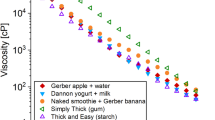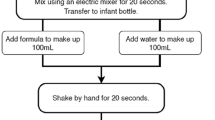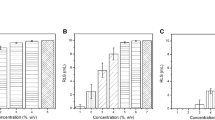Abstract
Individuals with dysphagia are commonly provided with oral fluids thickened to prevent aspiration. Most thickening agents are either gum-based (guar or xanthan) or are derived from modified starches. There is evidence, predominantly anecdotal, that dysphagic individuals are subclinically dehydrated. Dysphagia has a particular impact on elderly individuals and there is justifiable concern for dehydration in this population. It has been speculated that dehydration may, in part, be the result of the water-holding capacity of these thickening agents decreasing water absorption from the gut. The aim of this study was to determine the rate of intestinal absorption of water from thickened fluids. The method used was a laboratory tracer study in rats and humans in vivo. We found that there were no significant differences in water absorption rates between thickened fluids or pure water irrespective of thickener type (modified maize starch, guar gum, or xanthan gum). These data provide no support for the view that the addition of thickening agents, irrespective of type, to orally ingested fluids significantly alters the absorption rate of water from the gut.






Similar content being viewed by others
References
Wilkinson T, de Picciotto J: Swallowing problems in the normal ageing population. S Afr J Commun Disord 46:55–64, 1999
Bloem BR, Lagaay AM, van Beek W, Haan J, Roos RA, Wintzen AR: Prevalence of subjective dysphagia in community residents aged over 87. BMJ 300(6726):721–722, 1990
DePippo KL, Holas MS, Reding MJ, Mandel FS, Lesser ML: Dysphagia therapy following stroke: a controlled trial. Neurology 44:1655–1660, 1994
Meng NH, Wang TG, Lien IN: Dysphagia in patients with brainstem stroke: incidence and outcome. Am J Phys Med Rehabil 79:170–175, 2000
Garcia JM, Chambers E, Molander M: Thickened liquids: practice patterns of speech-language pathologists. Am J Speech Lang Pathol 14:4–13, 2005
Steele CM, Van Lieshout PH, Goff HD: The rheology of liquids: a comparison of clinician’s subjective impressions and objective measurements Dysphagia 18:182–195, 2003
Kedlaya D, Brandstater ME: Swallowing, nutrition, and hydration during acute stroke care. Top Stroke Rehabil 9:23–38, 2002
Bath PM, Bath FJ, Smithard DG: Interventions for dysphagia in acute stroke. Cochrane Database Syst Rev (2):CD000323, 2000
Wright L, Cotter D, Hickson M, Frost G: Comparison of energy and protein intakes of older people consuming a texture modified diet with a normal hospital diet. J Hum Nutr Diet 18:213–219, 2005
Whelan K: Inadequate fluid intakes in dysphagic acute stroke. Clin Nutr 20:423–428, 2001
Finestone HM, Foley NC, Woodbury GM, Greene-Finestone L: Quantifying fluid intake in dysphagic stroke patients: a preliminary comparison of oral and nonoral strategies. Arch Phys Med Rehabil 82:1744–1746, 2001
Garon BR, Engle M, Ormiston C: A randomized control study to determine the effects of unlimited oral intake of water in patients with identified aspiration. J Neurol Rehabil 11:139–148, 1997
Cuffaro L, Levine AM, Harrison L, Levine D: Fluid intakes and hydration status of institutionalized elderly nursing home residents. J Am Diet Assoc 97(Suppl 1):A79, 1997
Goulding R, Bakheit AMO: Evaluation of the benefits of monitoring fluid thickness in the dietary management of dysphagic stroke patients. Clin Rehabil 14:119–124, 2000
Ferry M: Strategies for ensuring good hydration in the elderly. Nutr Rev 63:S22–S29, 2005
Amella EJ: Feeding and hydration issues for older adults with dementia. Nurs Clin North Am 39:607–623, 2004
Harrison MJ: Influence of haematocrit in the cerebral circulation. Cerebrovasc Brain Metab Rev 1:55–67, 1989
Kositzke JA: A question of balance—dehydration in the elderly. J Gerontol Nurs 16:4–11, 1990
Yasaka M, Yamaguchi T, Oita J, Sawada T, Shichiri M, Omae T: Clinical features of recurrent embolization in acute cardioembolic stroke. Stroke 24:1681–1685, 1993
Macqueen C, Taubert S, Cotter D, Stevens S, Frost G: Which commercial thickening agent do patients prefer? Dysphagia 18:46–52, 2003
Low J, Wyles C, Wilkinson T, Sainsbury R: The effect of compliance on clinical outcomes for patients with dysphagia on videofluoroscopy. Dysphagia 16:123–127, 2001
Pelletier CA: A comparison of consistency and taste of five commercial thickeners. Dysphagia 12:74–78, 1997
Chaplin M: Hydrocolloids, London South Bank University, 2005. Available at http://www.lsbu.ac.uk/water/index.html(July, 2006)
Alais C, Linden G: Food Biochemistry. Chichester, UK: Ellis Horwood Ltd., p 52
Takahashi H, Wako N, Okubo T, Ishihara N, Yamanaka J, Yamamoto T: Influence of partially hydrolyzed guar gum on constipation in women. J Nutr Sci Vitaminol (Tokyo) 40:251–259, 1994
Edwards CA, Eastwood MA: Caecal and faecal short-chain fatty acids and stool output in rats fed on diets containing non-starch polysaccharides. Br J Nutr 73:773–781, 1995
Alam NH, Meier R, Schneider H, Sarker SA, Bardhan PK, Mahalanabis D, Fuchs GJ, Gyr N: Partially hydrolyzed guar gum-supplemented oral rehydration solution in the treatment of acute diarrhea in children. J Pediatr Gastroenterol Nutr 31:503–507, 2000
Waynforth HB, Flecknell PA: Experimental and Surgical Technique in the Rat, 2nd ed. London: Academic Press, 1992
Rutter K, Hennoste L, Ward LC, Cornish BH, Thomas BJ: Bioelectrical impedance analysis for the estimation of body composition in rats. Lab Anim 32:65–71, 1998
Sopade PA, Halley PJ, Cichero JAY, Ward LC: Rheological characterization of food thickeners marketed in Australia in various media for the management of dysphagia. I. Water and Cordial. J Food Process Eng 79:69–82, 2007
Atkins GL: Multicompartment Models for Biological Systems. London: Methuen, 1969
Zar JH: Biostatistical Analysis, 3rd ed. Englewood Cliffs, NJ: Prentice–Hall, 1996
Cornish BH, Jacobs A, Thomas BJ, Ward LC: Optimising electrode sites for segmental bioimpedance measurements. Physiol Meas 20:241–250, 1999
Thomas BJ, Ward LC, Cornish BH: Bioimpedance spectrometry in the determination of body water compartments: accuracy and clinical significance. Appl Radiat Isot 49:447–455, 1998
Schoeller DA: Hydrometery. In: Roche AF, Heymsfield SB, Lohman TG (eds.): Human Body Composition. Champaign, IL: Human Kinetics Press, 1996
Cornish BH, Ward LC, Thomas BJ, Jebb SA, Elia E: Evaluation of body water volumes in humans by multiple frequency bioelectrical impedance analysis (MFBIA). Eur J Clin Nutr 50:159–164, 1996
Davis JM, Lamb DR, Burgess WA, Bartoli WP: Accumulation of deuterium oxide in body fluids after ingestion of D2O-labeled beverages. J Appl Physiol 63:2060–2066, 1987
Miller M, Cosgriff J, Forbes G: Bromide space determination using anion-exchange chromatography for measurement of bromide. Am J Clin Nutr 50:168–170, 1989
Armstrong LE: Hydration assessment techniques. Nutr Rev 63:40–54, 2005
Mourad FH: Animal and human models for studying effects of drugs on intestinal fluid transport in vivo. J Pharmacol Toxicol Methods 50:3–12, 2004
Davis JM, Burgess WA, Slentz CA, Bartoli WP: Fluid availability of sports drinks differing in carbohydrate type and concentration. Am J Clin Nutr 51:1054–1057, 1990
Jankowski CM, Sonko BJ, Gozansky WS, Kohrt WM: Deuterium dilution: the time course of 2H enrichment in saliva, urine, and serum. Clin Chem 50:1699–1701, 2004
Lambert CP, Ball D, Leiper JB, Maughan RJ: The use of a deuterium tracer technique to follow the fate of fluids ingested by human subjects: effects of drink volume and tracer concentration and content. Exp Physiol 84:391–399, 1999
Hill RJ, Bluck LJC, Davies PSW: Using a non-invasive stable isotope tracer to measure the absorption of water in humans. Rapid Commun Mass Spectrom 18:701–706, 2004
Cichero JAY, Hay G, Murdoch BE, Halley PJ: Videofluoroscopic fluids versus mealtime fluids: Differences in viscosity and density made clear. J Med Speech Lang Pathol 5:203–215, 1997
Germain I, Dufresne T, Ramaswamy HS: Rheological characterization of thickened beverages used in the treatment of dysphagia. J Food Process Eng 73:64–74, 2006
Morris H: Dysphagia, medicines and older people: the need for education. Br J Community Nurs 10:419–420, 2005
Volkert D, Kreuel K, Stehle P: Fluid intake of community-living, independent elderly in Germany—a nationwide, representative study. J Nutr Health Aging 9:305–309, 2005
Volkert D, Kreuel K, Stehle P: “Nutrition beyond 65”—amount of usual drinking fluid and motivation to drink are interrelated in community-living, independent elderly people [in German]. Z Gerontol Geriatr 37:436–343, 2004
Kenney WL, Chiu P: Influence of age on thirst and fluid intake. Med Sci Sports Exerc 33:1524–532, 2001
Ferry M, Hininger-Favier I, Sidobre B, Mathey MF: Food and fluid intake of the SENECA population residing in Romans, France. J Nutr Health Aging 5:235–237, 2001
Haveman-Nies A, de Groot LC, Van Staveren WA: Fluid intake of elderly Europeans. J Nutr Health Aging 1:151–155, 1997
De Castro JM: Age-related changes in natural spontaneous fluid ingestion and thirst in humans. J Gerontol 47:321–330, 1992
Kayser-Jones J, Pengilly K: Dysphagia among nursing home residents Geriatr Nurs 20:77–84, 1999
Colodny N: Dysphagic independent feeders’ justifications for noncompliance with recommendations by a speech-language pathologist. Am J Speech Lang Pathol 14:61–70, 2005
Horwarth M, Ball A, Smith R: Taste preference and rating of commercial and natural thickeners. Rehabil Nurs 30:239–246, 2005
Brunstrom JM, Tribbeck PM, McRae AW: The role of mouth state in the termination of drinking behavior in humans. Physiol Behav 68:579–583, 2000
Paintal AS: A study of gastric stretch receptors; their role in the peripheral mechanism of satiation of hunger and thirst. J Physiol 29:255–270, 1954
Sobocinska J: Gastric distention and thirst: relevance to the osmotic thirst threshold and metering of water intake. J Physiol Behav 20:497–501, 1978
Frias ACD, Sgarbieri VC: Guar gum effects on food intake, blood serum lipids and glucose levels of Wistar rats. Plant Foods Hum Nutr 53:15–28, 1998
Hoad CL, Rayment P, Spiller RC, Marciani L, Alonso B, Traynor C: In vivo imaging of intragastric gelation and its effects on satiety in humans. J Nutr 134:2293–2300, 2004
Wilson MM, Morley JE: Impaired cognitive function and mental performance in mild dehydration. Eur J Clin Nutr 57(Suppl 2):S24–S29, 2003
Acknowledgments
The financial support of a University of Queensland Research Development Grant and of Steggall Nutrition Pty. Ltd. is gratefully acknowledged.
Author information
Authors and Affiliations
Corresponding author
Rights and permissions
About this article
Cite this article
Sharpe, K., Ward, L., Cichero, J. et al. Thickened Fluids and Water Absorption in Rats and Humans. Dysphagia 22, 193–203 (2007). https://doi.org/10.1007/s00455-006-9072-1
Received:
Accepted:
Published:
Issue Date:
DOI: https://doi.org/10.1007/s00455-006-9072-1




